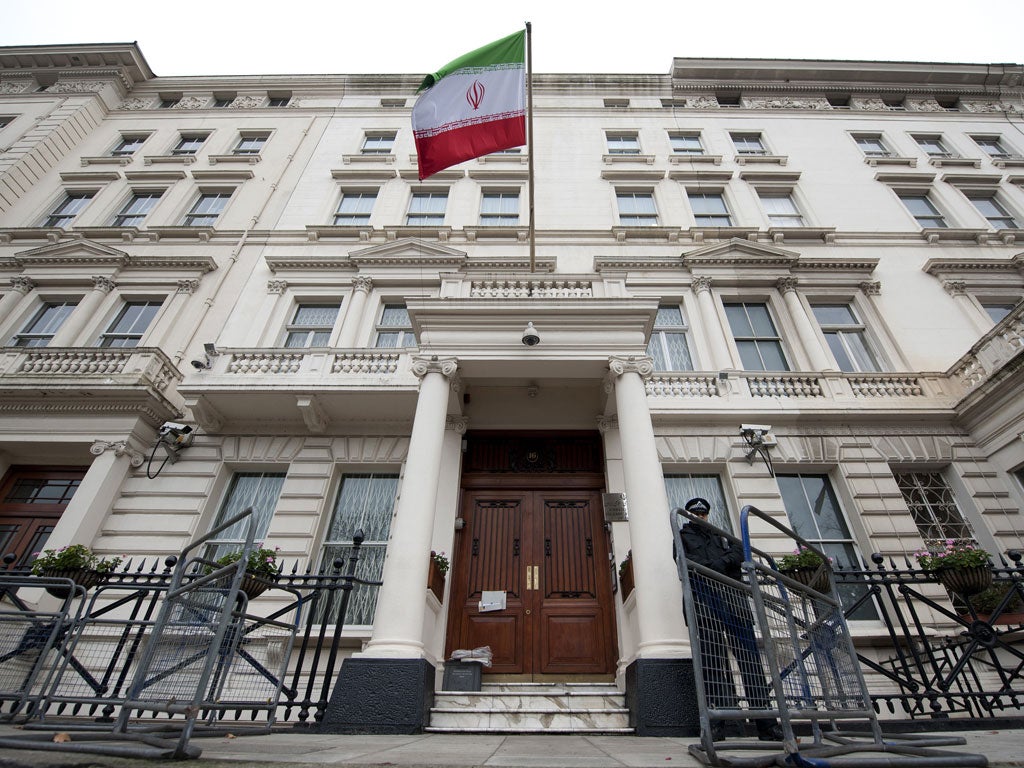Last Iranian officials leave UK

The last Iranian diplomats left the UK following the Government's decision to close their London base in response to the attacks.
On Wednesday, Foreign Secretary William Hague gave Iran 48 hours to remove all staff from UK soil in response to the "outrageous and indefensible" incident.
A Foreign Office spokesman said: "I can confirm that, earlier this afternoon, all diplomatic staff of the Iranian Embassy in London took off from Heathrow airport.
"They are returning to Iran in line with the Foreign Secretary's statement to Parliament on Wednesday."
The latest developments were discussed by Prime Minister David Cameron during talks in Paris, where he thanked President Nicolas Sarkozy for his country's help.
France was one of several European nations to withdraw ambassadors from Tehran in reaction to the looting of the building, which was widely condemned internationally.
"It was an opportunity to discuss the appalling events in Tehran and for me to thank President Sarkozy for the help the French gave to our staff and our embassy," Mr Cameron said.
As officials loaded luggage on to vehicles outside the embassy earlier, a group of 20 protesters shouted anti-regime slogans such as "terrorists, terrorists; must go, must go".
Many were members of the London Green Movement, which opposes president Mahmoud Ahmadinejad and campaigns on Iranian human rights issues.
Akbar Karimiam, 49, from Iran, said: "As an Iranian, I'm embarrassed about what happened in the British embassy in Tehran.
"The Iranian embassy here is not representing the nation, it's representing the regime. We are here to say goodbye to the dictator regime represented here."
Mr Hague hailed "a great deal of solidarity" on the issue among EU counterparts when they met yesterday to discuss mounting concerns that Tehran is intent on developing nuclear weapons.
They agreed another round of sanctions designed to further isolate the regime but Mr Hague stressed they were not directly prompted by the storming of the embassy.
All remaining UK embassy staff were evacuated on Wednesday.
Britain's ambassador to Iran tonight revealed how seven of his staff were seized by protesters during the terrifying attack on UK compounds in Tehran.
Dominick Chilcott said some workers and their relatives were sent to the embassy's residential complex in the north of the city before the protests for their safety, but ended up being taken by demonstrators who surged through security.
One worker barricaded himself in one of the "keeps" - parts of the compound designed to block out intruders until police arrive - for 45 minutes before he was overcome.
Mr Chilcott said staff were in a worse predicament than those in the main embassy building because they had gone there thinking it was a "place of safety", so when the attack happened it was "more of a surprise".
He added: "I think this made it more difficult for them generally.
"They did follow the well-established procedures, which was to try and get out of the compound if they could and two of our staff did manage to get out, although they got into a car and they were chased to the gate and just got out before the invaders reached them.
"So, it must have been really frightening for them.
"The others did what they had to do, which was go into the safe areas, what we call the keeps, and locked themselves in.
"The keeps are designed to keep them safe for a certain limited time until the police arrive. But what nobody knew then was that the police weren't going arrive, they were waiting to let the intruders do what they wanted to do.
"One of our staff was on his own in his keep and he barricaded the door with a heavy safe and a bed, and braced himself against the wall. And for 45 minutes he could hear people bashing down the door, smashing the windows and trying to get in because they knew he was there.
"It must have been a very frightening experience - until eventually the door gave way and they got him.
"Then our staff, in the end there were seven altogether, and they were taken to one of the properties and they were made to sit silently, they were not allowed to talk in the room by the invaders, without really knowing what was going on.
"It must have been a troubling experience. They were quite roughly handled, one or two of them, as well."
Mr Chilcott, who was only appointed to the role in October, told how protesters rampaged through the main embassy, "vandalising" one of Britain's "great historic" buildings.
A painting of the Queen was removed, while portraits of previous monarchs were mutilated and fires started in a "spiteful" attack.
Mr Chilcott said he and his staff had "no idea how it was going to end" but were eventually escorted out by police who told them to "lie low".
The Ambassador admitted it would be "untrue to say the thought" of a hostage situation "doesn't go through your mind".
He said there was a "chain of command" that linked to the hardline student protesters to the Iranian government and claimed there was a belief that "bashing the Brits" did a "lot of good".
He added: "Iran is not the sort of country where spontaneously a demonstration congregates then attacks a foreign embassy.
"That sort of activity is only done with the acquiescence and support of the state."
PA
Join our commenting forum
Join thought-provoking conversations, follow other Independent readers and see their replies
Comments
Bookmark popover
Removed from bookmarks